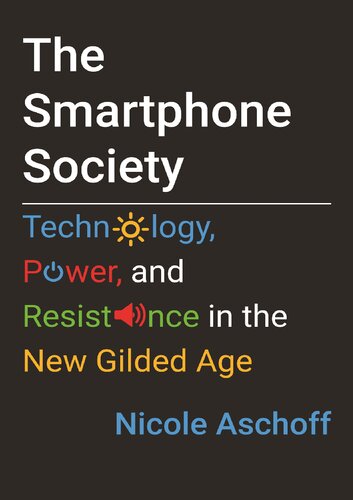
The Smartphone Society
Technology, Power, and Resistance in the New Gilded Age
کتاب های مرتبط
- اطلاعات
- نقد و بررسی
- دیدگاه کاربران
نقد و بررسی

December 15, 2019
How the ubiquity of smartphones has transformed society. Sociologist Aschoff (The New Prophets of Capital, 2015) provides both historical context and political insight, showing what is new in the current technological revolution and recalling earlier times when technology upended the status quo. As "the new Gilded Age" of the subtitle suggests, the author reminds us of how the automobile changed everything, especially the economy. Yet while radical change was widespread, society survived the aftershocks and advanced. "People have always been anxious about new technology," writes Aschoff, without minimizing the profound imbalances the smartphone underscores, especially in terms of economic and social inequality. She shows how activists have used the smartphone to document police brutality against black citizens while police (and the government at large) have employed the same technology of interconnection for monitoring and surveillance. Two of the most important recent social movements--#MeToo and Black Lives Matter--are both phenomena that have spread virally through a culture enabled by smartphones. At the same time, this culture has allowed the mobilization of white nationalists and other dangerous elements. We get our news on our phones, form our political beliefs, and see them echoed by like-minded partisans. The smartphone has all but dissolved the distinction between the personal and the political while changing the way we shop, date, and present ourselves to the outside world, with which we so often connect by smartphone. All the while, we are enriching and enabling global empires through collected data and underpaid labor. "Our fantasies about the digital frontier," writes Aschoff, "hide the hierarchical and ecologically destructive relationships of global capitalism." The author doesn't advocate for opting out, nor does she believe that the worst-case scenario is inevitable. Instead, she offers advice for pushing back and establishing some personal autonomy in the fight for "digital justice." A concise analysis of how best to live within the brave new smartphone world.
COPYRIGHT(2019) Kirkus Reviews, ALL RIGHTS RESERVED.

January 1, 2020
Smartphones have become ubiquitous pocket computers shaping society in more ways than one realize, according to Jacobin magazine editor at large Aschoff. In her first book, Aschoff details how smartphones affect society, showing how their rise has led to people being able to document police misconduct, while Twitter allows political leaders to address the public, and a multitude of online dating apps have helped people find partners. The author discusses these societal implications through a left-leaning lens, but readers of all political persuasions can find something relatable here. This is not a historical or business analysis; rather, this work cites research as well as personal stories to show how smartphones have positively and negatively impacted society. In addition to the technology crowd, readers curious about sociology or psychology will enjoy Aschoff's articulation of how dependent we have become on smartphones. VERDICT Aschoff introduces a creative and appealing way to discuss societal issues; this book will make readers contemplate their relationship with their phone and their own place in society.--Natalie Browning, Longwood Univ. Lib., Farmville, VA
Copyright 2020 Library Journal, LLC Used with permission.

February 15, 2020
For readers who find themselves wondering about the pocket-sized smartphones that increasingly absorb our time, this in-depth examination of those ubiquitous machines and the roles they play in our everyday lives will shed some light. Jacobin editor Aschoff offers a critique of capitalism and neoliberalism that goes hand in hand with a discussion of the new order being created by tech giants and national governments. She avoids a categorical moral judgment on our hand machines, as she frequently calls them, instead exploring the positive and negative ways they are used through essays that encourage readers to consider deeply what we frequently do on autopilot. How are smartphones made? Who mines the materials? How does that mining impact our environment? How much of our data do tech companies have access to, and why do we allow it? Aschoff considers these questions and more as she delves into the societal transformation we are all witness to, encouraging us all to be more deliberate, thoughtful, and aware of how we impact our phones and how they impact us.(Reprinted with permission of Booklist, copyright 2020, American Library Association.)

























دیدگاه کاربران